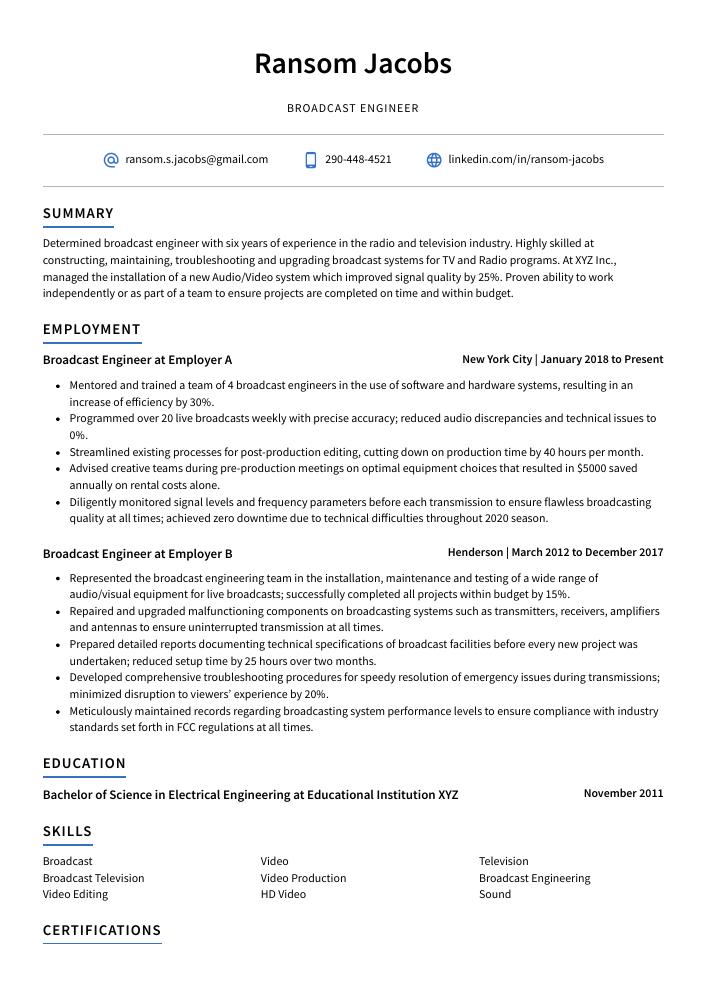Broadcast Engineer Resume Guide
Broadcast engineers are responsible for setting up, operating and maintaining the technical equipment used in television and radio broadcasts. They ensure that audio-visual systems are functioning correctly before a broadcast begins, as well as troubleshooting any issues during or after recording. Additionally, they may be tasked with creating sound effects and mixing music into shows.
You have a knack for working with audio and video equipment, which makes you the perfect candidate to fill any broadcast engineering role. To make sure employers know who you are and what you can do, it’s important that your resume stands out from the crowd.
This guide will walk you through the entire process of creating a top-notch resume. We first show you a complete example and then break down what each resume section should look like.
Table of Contents
The guide is divided into sections for your convenience. You can read it from beginning to end or use the table of contents below to jump to a specific part.
Broadcast Engineer Resume Sample
Ransom Jacobs
Broadcast Engineer
[email protected]
290-448-4521
linkedin.com/in/ransom-jacobs
Summary
Determined broadcast engineer with six years of experience in the radio and television industry. Highly skilled at constructing, maintaining, troubleshooting and upgrading broadcast systems for TV and Radio programs. At XYZ Inc., managed the installation of a new Audio/Video system which improved signal quality by 25%. Proven ability to work independently or as part of a team to ensure projects are completed on time and within budget.
Experience
Broadcast Engineer, Employer A
New York City, Jan 2018 – Present
- Mentored and trained a team of 4 broadcast engineers in the use of software and hardware systems, resulting in an increase of efficiency by 30%.
- Programmed over 20 live broadcasts weekly with precise accuracy; reduced audio discrepancies and technical issues to 0%.
- Streamlined existing processes for post-production editing, cutting down on production time by 40 hours per month.
- Advised creative teams during pre-production meetings on optimal equipment choices that resulted in $5000 saved annually on rental costs alone.
- Diligently monitored signal levels and frequency parameters before each transmission to ensure flawless broadcasting quality at all times; achieved zero downtime due to technical difficulties throughout 2020 season.
Broadcast Engineer, Employer B
Henderson, Mar 2012 – Dec 2017
- Represented the broadcast engineering team in the installation, maintenance and testing of a wide range of audio/visual equipment for live broadcasts; successfully completed all projects within budget by 15%.
- Repaired and upgraded malfunctioning components on broadcasting systems such as transmitters, receivers, amplifiers and antennas to ensure uninterrupted transmission at all times.
- Prepared detailed reports documenting technical specifications of broadcast facilities before every new project was undertaken; reduced setup time by 25 hours over two months.
- Developed comprehensive troubleshooting procedures for speedy resolution of emergency issues during transmissions; minimized disruption to viewers’ experience by 20%.
- Meticulously maintained records regarding broadcasting system performance levels to ensure compliance with industry standards set forth in FCC regulations at all times.
Skills
- Broadcast
- Video
- Television
- Broadcast Television
- Video Production
- Broadcast Engineering
- Video Editing
- HD Video
- Sound
Education
Bachelor of Science in Electrical Engineering
Educational Institution XYZ
Nov 2011
Certifications
Certified Radio Operator (CRO)
Society of Broadcast Engineers
May 2017
1. Summary / Objective
A resume summary/objective for a broadcast engineer should be written to capture the attention of potential employers. In this section, you can highlight your experience in radio and television broadcasting, any certifications or qualifications that make you stand out from other applicants, as well as your ability to troubleshoot complex technical issues quickly and efficiently. Additionally, if applicable, mention any awards or recognition you have received for excellence in engineering.
Below are some resume summary examples:
Dependable broadcast engineer with 7+ years of experience providing technical support and troubleshooting for live broadcast systems. Skilled in designing, building, and maintaining complex broadcasting infrastructure including audio/video equipment, satellites dishes, transmitters, routers and switches. Seeking to join ABC Company to leverage expertise towards achieving optimal performance from the latest broadcast technologies.
Driven broadcast engineer with 3+ years of experience in the industry. Experienced working on live broadcasts and recording studio sessions, as well as setting up equipment for broadcast events. Skilled at troubleshooting audio/visual issues quickly and efficiently to ensure that projects are completed within tight deadlines. Committed to providing quality work while maintaining a positive attitude throughout every project.
Hard-working broadcast engineer with 5+ years of experience in designing and maintaining broadcast systems for radio and television. Adept at troubleshooting, repairing, calibrating and testing a variety of equipment to ensure optimal performance. Successfully installed an HDTV transmitter system that increased the range by 50%. Experienced in working with AJA Vision Switcher software as well as Adobe Premiere Pro.
Reliable broadcast engineer with 7+ years of experience in the field. Highly knowledgeable in all aspects of broadcasting, from signal acquisition to post-production and transmission. Proven track record for maintaining 99% uptime on broadcast systems while troubleshooting issues quickly and efficiently. Seeking a position at ABC Broadcast to utilize my technical skillset and drive innovation within the industry.
Accomplished broadcast engineer with 5+ years’ experience in the TV/radio industry. Expertise in all aspects of broadcast engineering and operations, from installation to maintenance. Creative problem solver who can quickly diagnose issues related to audio-visual equipment and systems. Proven track record for delivering high-quality projects on time, within budget, using best practices and safety protocols.
Proficient broadcast engineer with 10+ years of experience designing, operating, and maintaining broadcast systems for radio and television networks. Skilled in quickly troubleshooting technical problems to minimize downtime. At ABC Network, provided 24/7 support that increased system uptime by 20%. Seeking a role at XYZ station where I can apply my extensive knowledge to develop innovative solutions.
Committed broadcast engineer with 10+ years of experience in designing, installing, and maintaining radio and television systems. Specialize in modern digital broadcast technology for both analog and HDTV signals. At ABC Broadcasting Company, oversaw a team that successfully completed a complex network upgrade project within budget—resulting in an estimated 25% increase in operational efficiency.
Passionate broadcast engineer with 8+ years of experience in television and radio. Expertise in troubleshooting hardware, software, cabling systems, and audio-visual components. Proven ability to install new equipment quickly and efficiently while maintaining quality standards. Seeking a role at ABC where I can utilize my skills to help the team reach their broadcasting goals on time.
2. Experience / Employment
In the experience section, you provide details on your work history. This should be written in reverse chronological order, meaning the most recent role is listed first.
When writing about what you did in each job, stick to bullet points; this makes it easier for the reader to take in all of the information quickly and easily. You want to make sure that when describing your duties and accomplishments, they are detailed enough so that anyone reading them can understand exactly what was done and how successful it was.
For example instead of saying “Installed broadcast equipment,” you could say “Installed complex radio broadcasting systems with a success rate of 95%, ensuring optimal performance.”
To write effective bullet points, begin with a strong verb or adverb. Industry specific verbs to use are:
- Installed
- Configured
- Monitored
- Troubleshot
- Optimized
- Calibrated
- Programmed
- Tested
- Analyzed
- Assembled
- Repaired
- Upgraded
- Fabricated
- Aligned
- Commissioned
Other general verbs you can use are:
- Achieved
- Advised
- Assessed
- Compiled
- Coordinated
- Demonstrated
- Developed
- Expedited
- Facilitated
- Formulated
- Improved
- Introduced
- Mentored
- Participated
- Prepared
- Presented
- Reduced
- Reorganized
- Represented
- Revised
- Spearheaded
- Streamlined
- Structured
- Utilized
Below are some example bullet points:
- Installed, maintained and troubleshot broadcast equipment including routers, transmitters and encoders; reduced operating costs by 10% through proactive maintenance.
- Demonstrated advanced knowledge of signal processing and digital audio/video production technology to successfully migrate existing systems with minimal downtime.
- Analyzed system performance data & identified areas for improvement; conducted upgrades on all broadcast related software resulting in a 5x increase in program delivery efficiency.
- Coordinated activities between various departments such as engineering, operations, sales & marketing in order to ensure successful completion of projects within deadlines set by the client/management team.
- Independently managed up to 20 simultaneous clients’ technical needs while providing excellent customer service throughout the entire project lifecycle from pre-production planning up until post-delivery follow ups.
- Upgraded broadcast and production equipment for a major news network, increasing efficiency of all audio/video operations by 23%.
- Spearheaded the installation and maintenance of over 40 broadcasting consoles across five different studio sets, ensuring optimal performance at all times.
- Successfully troubleshot technical issues with broadcast systems in a timely manner, reducing downtime by an average of 15 minutes per issue.
- Expedited emergency repairs on complex broadcast infrastructure to keep transmission running without interruption; improved responsiveness rate for critical incidents by 25%.
- Facilitated remote video broadcasts from various locations worldwide using satellite connections and broadband networks; completed 7 live transmissions within budget guidelines set forth by management team (+$1K savings).
- Assembled and configured audio-visual equipment and other broadcast systems to facilitate the delivery of various on-air programs, films, commercials and sports shows; reduced setup time by 30%.
- Utilized experience in multiple software applications such as Adobe Audition and Pro Tools to mix soundtracks for live performances in television studios across 3 states.
- Actively monitored signal levels during broadcasts using oscilloscopes & RF meters; identified any technical problems or interference quickly before they affected transmission quality or disrupted programming schedules.
- Optimized video streams with encoding techniques such as closed captioning & digital video compression, resulting in a 20% increase in viewer engagement ratings over a 2 month period.
- Improved audio system performance through careful calibration of microphones & loudspeakers according to industry standards; increased production efficiency by 15%.
- Configured and maintained a variety of broadcast equipment, including routers, audio consoles and signal processors; improved the efficiency of workflows by 35%.
- Structured wiring systems for studios to ensure proper functioning of all cabling components; reduced downtime on broadcasts due to technical issues by 25%.
- Participated in pre-production meetings with members from production teams to determine requirements for upcoming projects and allocated necessary resources accordingly.
- Thoroughly inspected hardware configurations before live broadcasts as part of quality assurance measures, ensuring that sound levels were consistent throughout each program’s duration.
- Fabricated custom cables used in broadcasting operations; saved $1,500 per month in repair costs through preventive maintenance practices over an 18-month period.
- Commissioned audio and video equipment to ensure optimal performance of broadcast systems, resulting in a 20% improvement in sound quality.
- Reduced expenditure on studio lighting and audio-visual components by $10,000 per quarter through judicious budgeting & cost optimization strategies.
- Calibrated live broadcasting equipment with accuracy and precision; achieved 100% coverage for over 10 local radio stations across multiple frequencies within the allocated timeframe (6 hours).
- Monitored various operational aspects such as signal reception levels, power output from transmitters & receivers, digital encoding/decoding etc., ensuring uninterrupted transmission of signals at all times.
- Resourcefully designed backup plans for emergency situations such as natural disasters or power outages; set up an alternative network that enabled continuous streaming without disruptions during hurricane season (+2 weeks).
- Formulated and implemented technical solutions for the broadcast of over 75 live television and radio shows, ensuring a seamless transmission from studio to air with minimal downtime.
- Assessed audio-visual technology needs; upgraded equipment regularly resulting in an average 30% improvement in sound quality production within one year.
- Troubleshot all operational issues related to broadcasting systems, such as antennas, mixers & recording media etc., reducing repair costs by 25%.
- Reliably monitored signal strength during broadcasts and optimized antenna settings accordingly; increased reception reliability by 40%.
- Presented monthly reports on hardware maintenance and upgrades to executive management team that resulted in an additional $7000 allocated for new broadcasting equipment annually.
- Achieved a 20% improvement in broadcast signal stability by reorganizing studio wiring configurations and introducing new audio/visual equipment.
- Efficiently maintained all broadcast systems including microphones, cameras, amplifiers and other sound & light equipment with minimal downtime; reduced repair costs by $4,000 over a 3-month period.
- Reorganized the entire radio station’s library of music & audio recordings according to genre for easier searchability and access; increased efficiency in song selection processes by 30 minutes on average per show.
- Introduced innovative solutions such as automated lighting technology which enabled quick set-up of different scenes during live shows while reducing power consumption levels significantly (by 40%).
- Compiled detailed technical reports outlining issues with current broadcasting hardware after every inspection to ensure that any potential problems were immediately addressed before they affected production quality or caused disruption.
- Revised audio and video production equipment setup to align with industry best practices, resulting in a 10% improvement of broadcast quality.
- Aligned digital signal processing systems for radio broadcasts, reducing static noise levels by 50%.
- Tested audio consoles for sound clarity and reliability; identified technical issues on-site quickly and made timely repairs that improved performance by 40%.
- Effectively operated television cameras during live events, ensuring signals were transmitted without interruption to over 500 viewers across the country per event.
3. Skills
The skillset employers require in an employee will likely vary, either slightly or significantly; skimming through their job adverts is the best way to determine what each is looking for. One organization might require a broadcast engineer to be proficient in audio engineering, while another might need someone with experience in video editing.
It is essential that you tailor the skills section of your resume for each job posting; this way, it will get past any applicant tracking systems used by employers and into the hands of an actual human being.
In addition to listing relevant technical skills here, you should also discuss them further in other sections such as the summary or work experience.
Below is a list of common skills & terms:
- Adobe Audition
- Audio Editing
- Audio Engineering
- Audio Post Production
- Avid
- Avid Media Composer
- Broadcast
- Broadcast Engineering
- Broadcast Journalism
- Broadcast Television
- Broadcasting
- Camera
- Camera Operating
- Digital Asset Management
- Digital Media
- Digital TV
- Digital Video
- Editing
- Electronics
- Entertainment
- Film
- Final Cut Pro
- HD Video
- IPTV
- Integration
- Live Events
- Live Sound
- Media Production
- Multimedia
- Music
- Networking
- New Media
- Non Linear Editing
- Post Production
- Pro Tools
- Producing
- Radio
- Radio Broadcasting
- Recording
- Satellite
- Satellite Communications
- Social Media Marketing
- Sound
- Streaming Media
- Telecommunications
- Television
- Transmission
- Troubleshooting
- VOD
- Video
- Video Editing
- Video Production
- Videography
- Windows
4. Education
Including an education section on your resume will depend largely on how far along you are in your career. If you just graduated and have no work experience, mentioning your educational background below the resume objective is a great way to start off. However, if you have extensive broadcast engineering experience to showcase, omitting an education section altogether might be beneficial for emphasizing that instead of what school or college degree you hold.
If including an education section is necessary, try to mention courses related to the broadcast engineer role as well as any relevant certifications or qualifications obtained throughout this journey.
Bachelor of Science in Electrical Engineering
Educational Institution XYZ
Nov 2011
5. Certifications
Certifications are a great way to demonstrate your expertise and proficiency in a particular field. They are also an indication that you have kept up with the latest trends, technologies, and best practices within your industry.
When applying for jobs, it is important to include any certifications you may have on your resume as this will give employers confidence that you possess the necessary skillset required for the role. Additionally, if there is a specific certification related to the job position being applied for then make sure to highlight it prominently on your resume so potential employers can easily see it.
Certified Radio Operator (CRO)
Society of Broadcast Engineers
May 2017
6. Contact Info
Your name should be the first thing a reader sees when viewing your resume, so ensure its positioning is prominent. Your phone number should be written in the most commonly used format in your country/city/state, and your email address should be professional.
You can also choose to include a link to your LinkedIn profile, personal website, or other online platforms relevant to your industry.
Finally, name your resume file appropriately to help hiring managers; for Ransom Jacobs, this would be Ransom-Jacobs-resume.pdf or Ransom-Jacobs-resume.docx.
7. Cover Letter
Including a cover letter with your job application is a great way to stand out from the competition. It should be made up of 2 to 4 paragraphs that provide more detail about you and why you are an ideal fit for the role.
Cover letters can help demonstrate how your experience, qualifications and skills make you unique compared to other applicants. They also give recruiters a better understanding of who you are as a person, allowing them to get a sense of what kind of employee they would be hiring if they chose you.
Below is an example cover letter:
Dear Damian,
I am writing to apply for the Broadcast Engineer position at KABC-TV. With more than 15 years of experience in broadcast engineering and a proven track record of successful project management, I am confident I will be an asset to your organization.
In my current role as Broadcast Engineer at KCBS-TV, I oversee all aspects of engineering operations for our news department. This includes managing a team of engineers and technicians, developing and implementing technical solutions, and troubleshooting equipment issues. In addition, I have extensive experience with live broadcasts, having engineered numerous newscasts and special event coverage. My ability to stay calm under pressure has been essential in ensuring the success of these broadcasts.
I am also well-versed in the latest broadcasting technologies and trends. In my previous role at NBCUniversal, I was responsible for researching and testing new broadcast technologies before their implementation across our station group. This work resulted in significant cost savings for the company by identifying products that were not compatible with our existing infrastructure or that did not meet our needs prior to purchase.
I believe my skills and experience make me uniquely qualified for this position at KABC-TV. I look forward to speaking with you soon about how I can contribute to your team’s success.
Sincerely,
Ransom
Broadcast Engineer Resume Templates
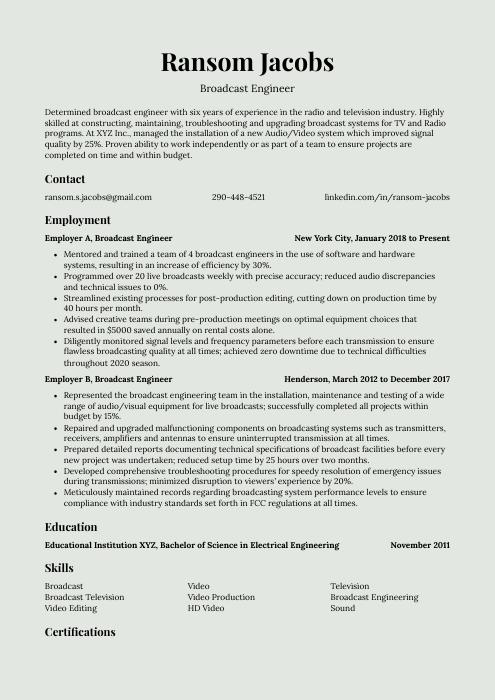 Saola
Saola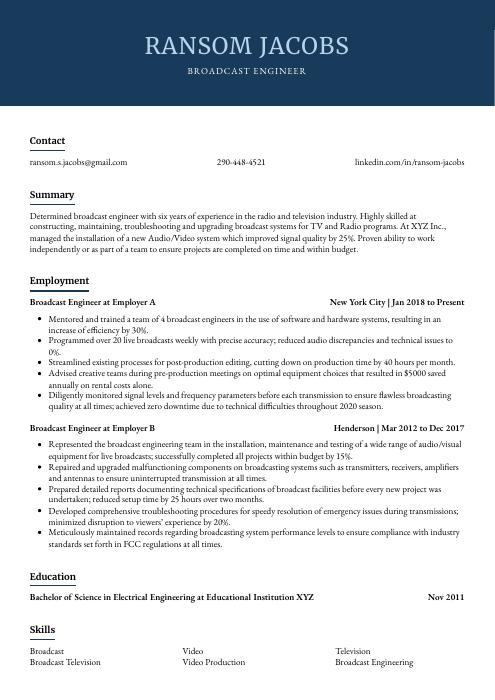 Bonobo
Bonobo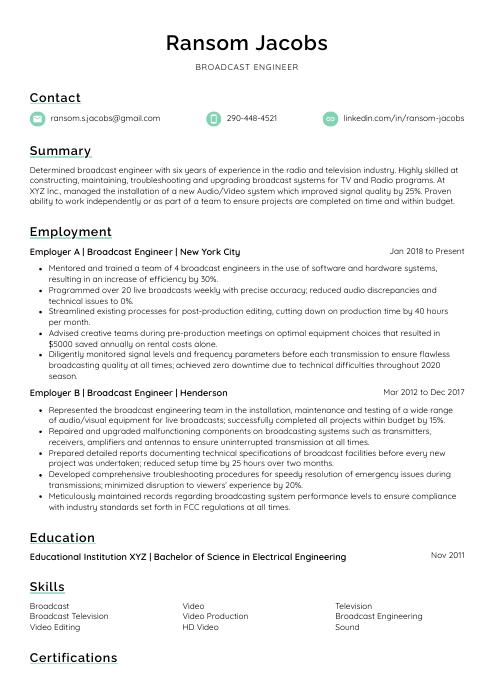 Lorikeet
Lorikeet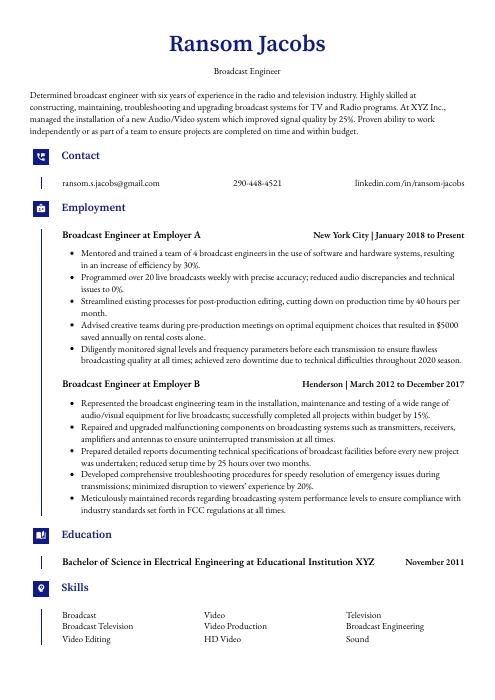 Gharial
Gharial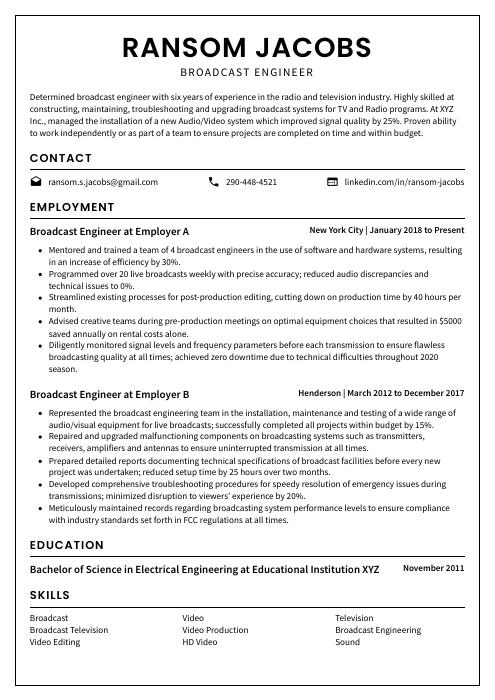 Cormorant
Cormorant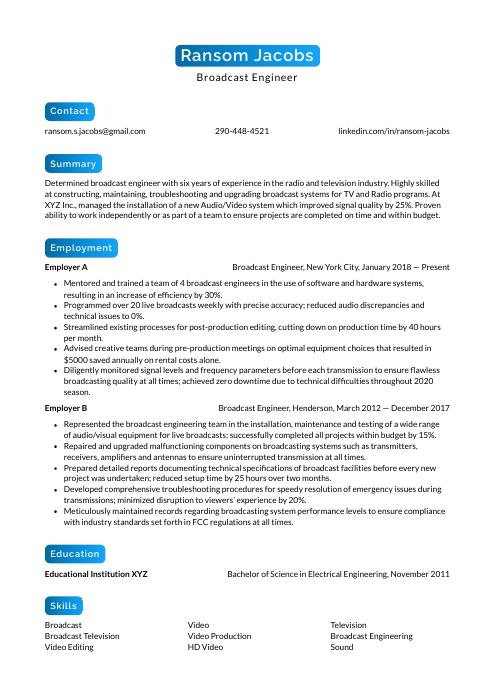 Kinkajou
Kinkajou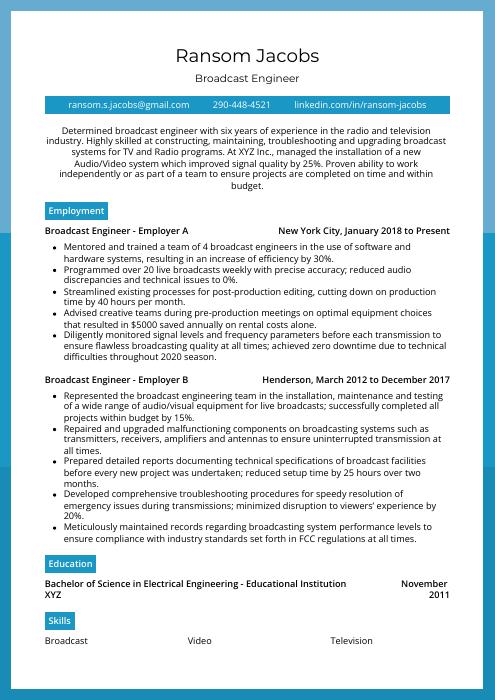 Rhea
Rhea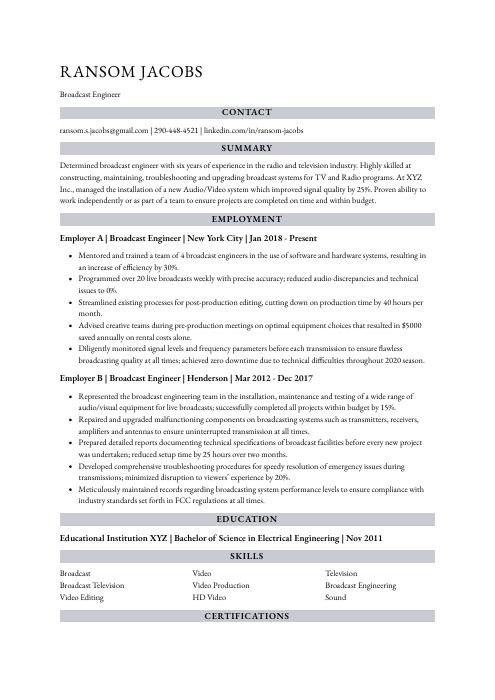 Numbat
Numbat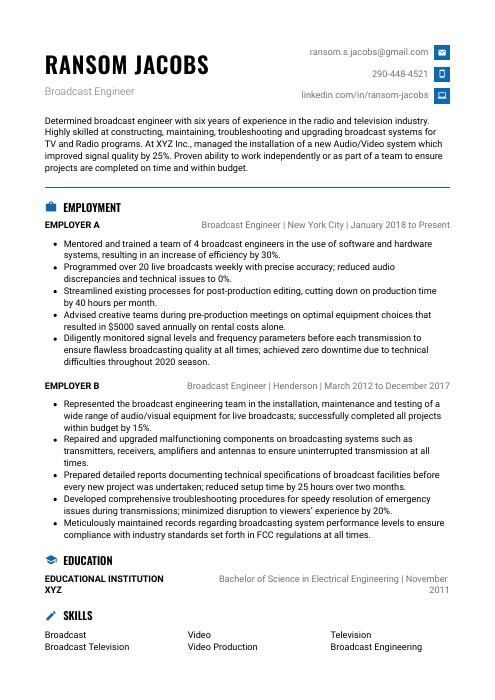 Echidna
Echidna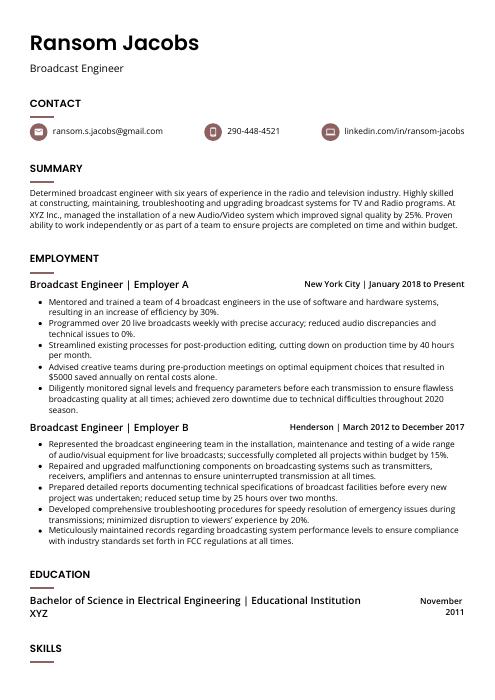 Fossa
Fossa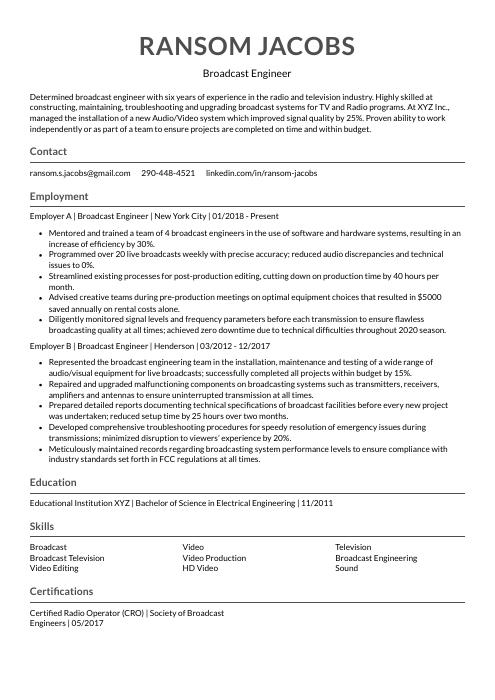 Indri
Indri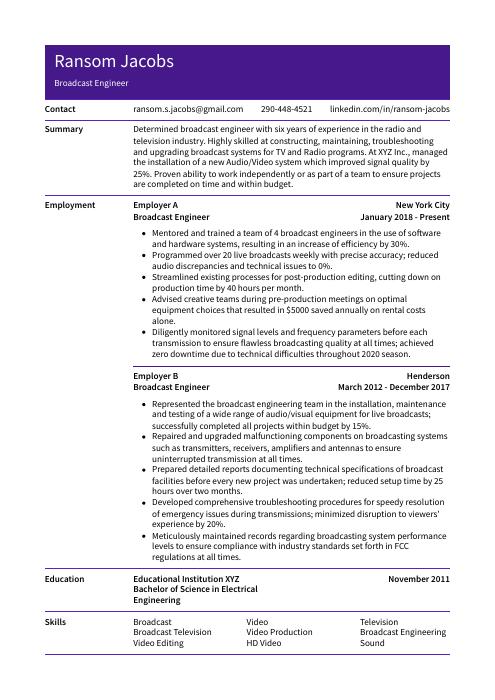 Pika
Pika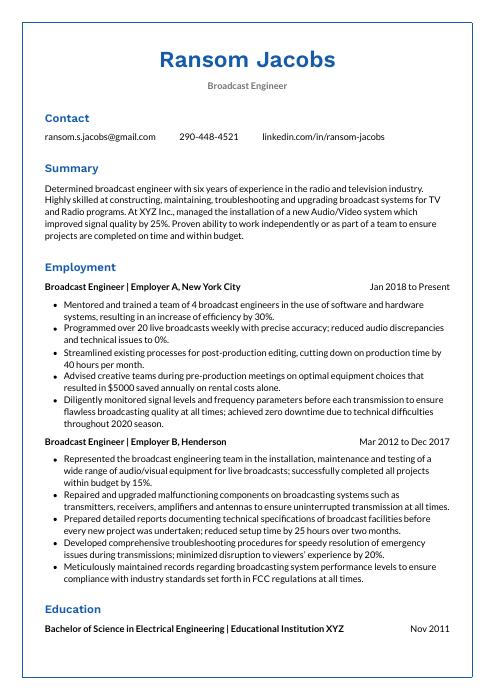 Markhor
Markhor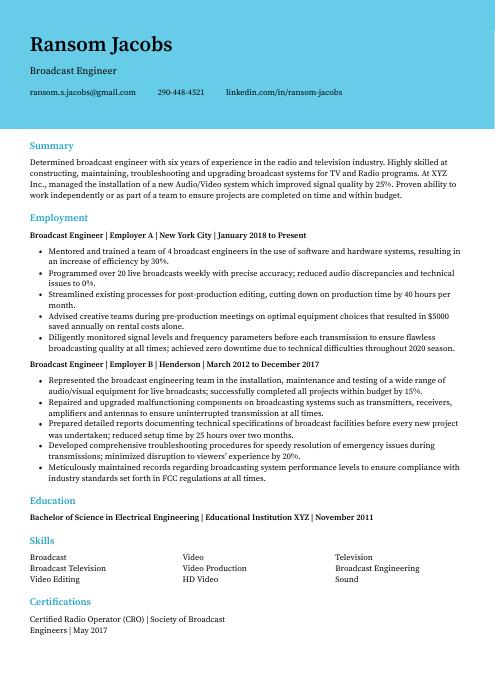 Dugong
Dugong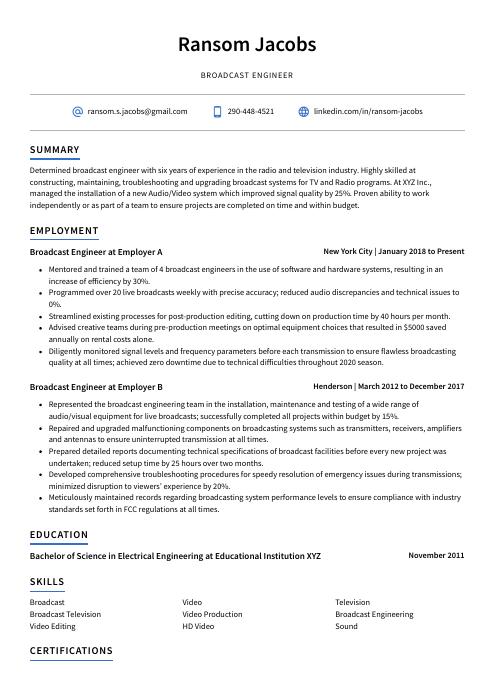 Axolotl
Axolotl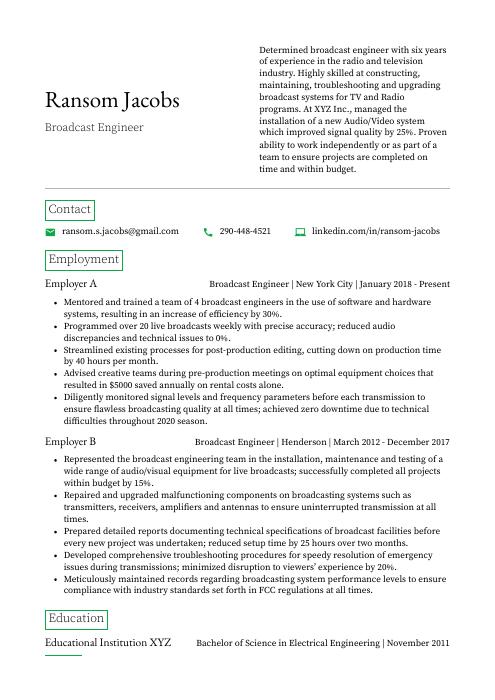 Quokka
Quokka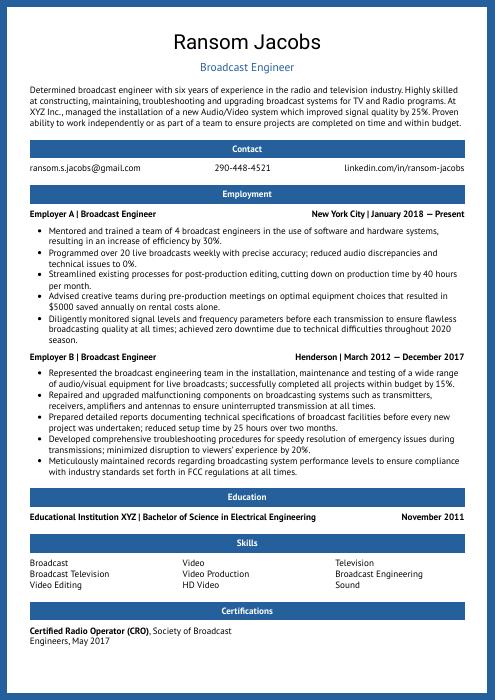 Ocelot
Ocelot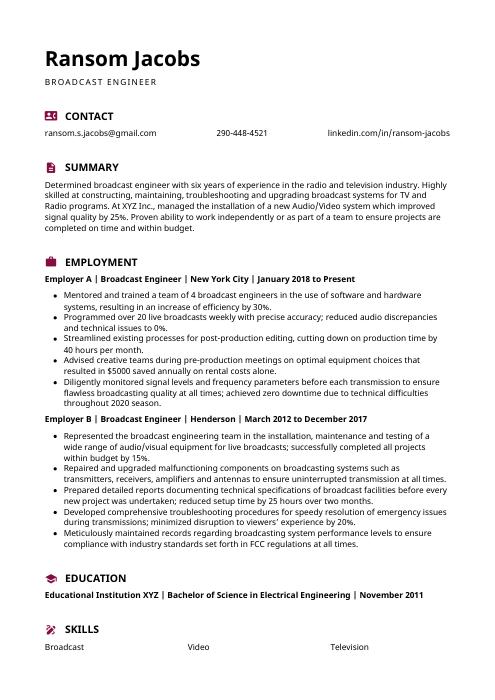 Hoopoe
Hoopoe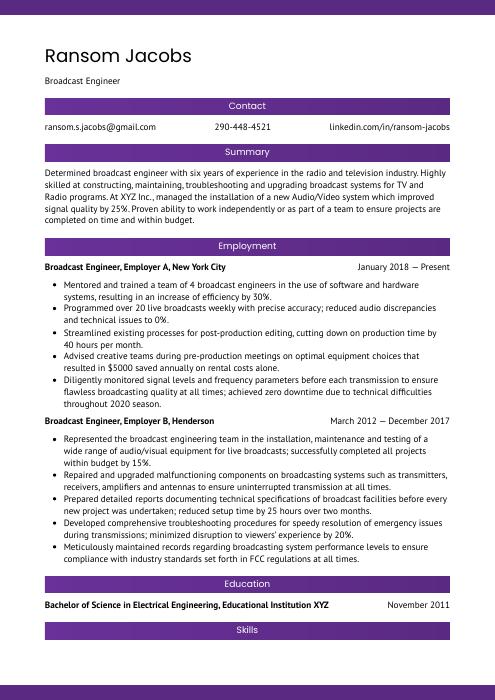 Jerboa
Jerboa Rezjumei
Rezjumei
